#poor Northern Ireland Scotland and wales
Explore tagged Tumblr posts
Text



















Boxing Day
The best way to celebrate the day is to take part in festivities in a country where Boxing Day is a bank holiday or public holiday. Watch some soccer, rugby, or cricket games, or go on a traditional fox hunt. If you can’t be in a country where these events are taking place, you could still get together with family and friends and eat leftovers from Christmas, or make some foods traditionally eaten on Boxing Day. You could also go shopping, as this is another important part of the day in many countries.
Boxing Day takes place the day after Christmas and is primarily observed in the United Kingdom, where it started, as well as in countries that were once part of the British crown. There are a few possible theories as to how it got started, but its exact origin is unclear.
One theory says it was inspired by Christmas boxes. In seventeenth-century Great Britain, boxes holding a present or gratuity were given to tradesman and workers in service industries for their previous year’s work. This went back to an even earlier tradition where servants would wait on and serve their rich masters on Christmas Day and would visit and celebrate with their own families on the day after Christmas. Their rich masters would sometimes give them a box with leftover food, a bonus, or another type of gift.
The day may have also stemmed from alms boxes that were put in Anglican churches on Christmas Day or during Advent and opened on the day after Christmas. These boxes collected money for the poor. Similarly, boxes were put outside of churches to collect money on Saint Stephen’s Day, which is held the day after Christmas. The events in the song “Good King Wenceslas” take place on Saint Stephen’s Day. The song recounts a story of King Wenceslas, a Bohemian king of the tenth century, bringing food and wine to a poor man. There is one other possible source for the beginning of the day. Ships once set sail containing a box of money for good luck. If the trip was a success, the box would be given to a priest, and he would open it on Christmas and give its contents to the poor.
Boxing Day has been a bank holiday in England, Wales, North Ireland, and Canada since 1871. It is celebrated in Australia, New Zealand, Trinidad and Tobago, and Nigeria. It is celebrated in Hong Kong, where the United Kingdom held sovereignty until 1997. In Ireland and in parts of Spain, it is known as Saint Stephen’s Day. It is celebrated as Second Christmas Day in some European countries, such as Poland, Hungary, Germany, Switzerland and the Netherlands; it is celebrated as such in Scandinavia as well. Boxing Day is generally not celebrated in the United States.
In some countries where it is celebrated as a bank holiday or public holiday, it is observed a day or two after December 26. If December 26 takes place on a Saturday, it may be observed the following Monday. If December 26 is on a Sunday, it may be observed on the following Tuesday. This is not always the case, however, as it is often observed on a Sunday if it falls on a Sunday.
Boxing Day is a day of the gathering of family and friends. Leftovers from Christmas are commonly eaten. Popular foods include baked ham, mince pies, Christmas cakes, and other desserts. In many countries of celebration, it is a shopping day similar to Black Friday. Sales take place and many retailers run them the whole week. Although, in some places, such as in parts of Canada, stores aren’t allowed to be open, in order to give families time to be together instead.
Sports are an important part of Boxing Day. In the United Kingdom, the top football (soccer) leagues of England, Scotland, and Northern Ireland play games. Lower leagues play games as well, and rugby leagues also hold matches. In various countries, events of other sports, such as cricket, horse racing, yacht racing, hockey, and boxing are often held to celebrate the day. Fun runs and swims in the cold English Channel take place. Fox hunting meets have been held for hundreds of years. A law passed in 2004, which went into effect the following year, banned the use of dogs to attack animals during hunts. But hunters have still used their dogs to chase artificial scents on the day, and have still gone on hunts where dogs are used to flush out foxes, but not to attack them.
Boxing Day, also known as Saint Stephen’s Day and Second Christmas Day, is being observed today! It has always been observed annually on December 26th.
Source
#Stephanstag#not for a long time#travel#Atlanta#Christmas in July#hotel lobby#Boxing Day#26 December#Georgia#Schweiz#Switzerland#Luzern#Lucerne#Lake Lucerne#Rigi#River Reuss#old town#Christmas lights#landmark#tourist attraction#Saint Stephen’s Day#Second Christmas Day#holiday#BoxingDay#SaintStephensDay#Melchsee Frutt#Vierwaldstättersee#Obwalden#original photography#vacation
2 notes
·
View notes
Text









The coronavirus (COVID-19) pandemic 😷 did not affect all aspects of SH's life. He and his co-stars, including the director (pictured), broke the British film industry's Covid-19 guidelines.
There were COVID-19 restrictions for cast and crew in the UK. Film and HETV production was permitted in England, Northern Ireland, Scotland and Wales. These restrictions covered all aspects of the production process.
Throughout the pandemic in the UK, SH declared himself an exception by allowing himself to break the law. The issue of “one rule for him and another for the rest of us” raised his head frequently. Don’t come here like a poor guy if you never obeyed the COVID-19 law like every one of us that took steps to reduce the risk.
Everybody Knows What You Did During the Pandemic ��� 🐰
#COVIDIOT
5 notes
·
View notes
Text
A United Nations committee has accused the UK government of demonising disabled people and treating them as “undeserving citizens” by preparing to fund tax cuts through slashing disability benefits.
Members of the UN’s committee on the rights of disabled people provided a string of examples of how the government had continued to breach its obligations under the UN Convention on the Rights of Persons with Disabilities.
They pointed to a benefits system that traumatised claimants and led to some taking their own lives; increasing rates of institutionalisation; and a disproportionate number of disabled people who were now too poor to heat their own homes or buy food.
The committee’s Australian vice-chair, Rosemary Kayess, said the social security system and rhetoric from ministers “devalues disabled people and undermines their human dignity”, and she suggested the government had breached its treaty obligations to “combat stereotypes, prejudices and harmful practices relating to disabled people”.
Kayess told a delegation of civil servants in Geneva that there was evidence of “regression” in how the UK government was meeting its obligations under the convention.
The committee was cross-examining the delegation, which included representatives from the devolved governments of Scotland, Wales and Northern Ireland, on progress since the UK government was found guilty of grave and systematic violations of the UN convention in 2016 as a result of breaches of articles on social security, employment and independent living.
Following the session, and the “significant” amount of written and oral evidence provided by disabled people, disabled people’s organisations and allies, the committee will now prepare a report on its findings.
Kayess, a human rights lawyer and Australia’s new disability discrimination commissioner, told the UK’s delegation on Monday: “We see a reform agenda that is framed in a political narrative that demonises disabled people, including proposals to cut disability benefits to reward working people by cutting taxes, which tells disabled people they are undeserving citizens.
“And this is coupled with an onerous and complex social benefit system that is the basis for trauma and preventable mental distress.”
Kayess said the committee had found a “pervasive framework and rhetoric that devalues disabled people and undermines their human dignity” within the social security system, and she suggested the government had breached its obligations under the convention to “combat stereotypes, prejudices and harmful practices relating to disabled people”.
She said: “Reforms within social welfare benefits are premised on a notion that disabled people are undeserving and skiving off and defrauding the system.
“This has resulted in hate speech and hostility towards disabled people.”
She also pointed to “increasing rates of institutionalisation” of disabled people, including those “living in secure psychiatric facilities due to a lack of community-based support”, and others forced into residential homes because of inadequate care and support.
And she highlighted evidence of increased use of “restraints, restrictive practices and coercive measures” in institutions, and the shortage of safe, accessible housing.
She also questioned whether the government had failed to meet its obligations to “closely” and “actively” consult disabled people’s organisations when drawing up its National Disability Strategy.
Just as it did in 2016, the committee raised significant concerns about the “complex and onerous” work capability assessment process, and the use of “inexperienced and unqualified” assessors.
Another committee member, Professor Laverne Jacobs, a disability rights and human rights law expert from Canada, said there had been a “repeated pattern” of disabled people taking their own lives after being denied an adequate standard of living by the Department for Work and Pensions.
She asked the government what measures it would take to ensure that its benefit eligibility and work capability systems were “trauma informed so that they do not cause mental health crises, suicide, and death”.
But she also asked what “redress” it would offer to those who have experienced trauma caused by the social security and assessment systems, and to the families of those claimants who had lost their lives through this trauma.
Jacobs said the committee had heard of disabled people facing “intolerable situations, even death, while trying to comply with the eligibility requirements of the UK government’s benefit regimes”, including the work capability assessment process.
She said that evidence they had been given suggested a “significant and shameful gap” between the convention’s requirements and the lived experiences of disabled people in the UK.
And, she said, the evidence suggested a failure to provide an adequate standard of living for disabled people, including disabled women, girls and older people, with a “disproportionate” number of disabled people “living in poverty without the ability to heat their homes or purchase food”.
She also asked the UK government what measures it was taking to ensure that disabled people can enjoy their rights under the UN convention to live independently in the community, and to address the shortage of personal assistants.
And she asked what the government was doing to ensure that disabled refugees and asylum-seekers can enjoy their right to live independently and in the community in the UK.
She urged the UK government to “improve on its commitment” to the rights of disabled people and take “immediate steps to remedy the issues that we have highlighted today”.
A third committee member, human rights lawyer Miyeon Kim, from South Korea, asked the UK delegation about the “biggest death crisis in the history of the NHS”, after campaigners called last year for a criminal investigation into a mental health trust, following a report that found more than 8,400 deaths linked to the Norfolk and Suffolk NHS Foundation Trust.
There was little attempt by the UK government to answer the questions asked by the committee members, with disabled people’s organisations who were present at the evidence session describing their attempts as “half-truths, untruths and smokescreen” (see separate story).
Alexandra Gowlland, deputy director of the Disability Unit, who had earlier delivered the UK government’s opening statement to the committee (see separate story), claimed it was committed to the UN convention, and pointed to the protection offered to disabled people by the Equality Act, including the public sector equality duty.
She told the committee: “Ensuring the voice of disabled people is properly heard is something which is very important to us in the UK government.”
Jennifer Heigham, DWP’s deputy director for strategy and briefing, pointed to the £105 billion in cost-of-living support the government had provided from 2022 to 2025, but failed to point out that working-age disabled people receiving non-means-tested disability benefits received just £150 a year in 2022 and another £150 in 2023-24 in disability-related cost-of-living payments.
She claimed the government was “delivering the most ambitious disability reform agenda in a generation” and was “proud to have a proven track record of increasing disability employment, and acting on disability discrimination, providing vital protections”.
And she said the government was “committed to ensuring our welfare system encourages and supports people into work, while providing a vital safety net for those who need it most”.
She added: “In the future, removing the work capability assessment will reduce the number of assessments people need to take to access benefits, give people the confidence to try work, and enable us to provide a more personalised approach.”
David Nuttall, deputy director of neurodiversity, diversity and learning disability at the Department of Health and Social Care, said the government was “investing in better training, accredited qualifications and launching a new national career structure for the adult social care workforce”.
And he said it had given new powers to the Care Quality Commission to inspect how local authorities were delivering their duties under the Care Act.
He claimed the government had “substantially invested in adult social care funding”, while the NHS long-term plan included a “long-term aim to improve community support for people with a learning disability, autistic people and those with serious mental illness”.
He said the government’s draft mental health bill – which appears to have been dumped by the government – included plans to tighten the criteria on when someone can be detained under the Mental Health Act “to ensure detention only happens where absolutely necessary”.
Apparently in response to the question from Miyeon Kim, he said the Care Quality Commission was “the independent regulator of health and social care in England and is responsible for making sure providers adhere to the fundamental standards to ensure services are safe, effective, person centred, responsive and well led”.
1 note
·
View note
Text
The gender pay gap has reduced to its lowest level since reporting became mandatory for businesses in 2017. However, women are still being paid just 91p for every £1 a man earns, according to analysis of official government data.
Almost four out of five companies and public bodies are still paying men more than women (78.4%) although the median pay gap reduced slightly from the previous year to 9.1% in 2023-2024, the lowest level since mandatory reporting became law in Great Britain in 2018.
However, the gender pay gap remains stubbornly higher in the public sector at 14.4% with almost nine-in-10 (87.6%) public sector organisations paying men more than women in comparison to just over three-quarters of private companies.
By 3pm on Friday – ahead of the midnight deadline for private companies – a record 10,380 organisations with 250 or more employees had filed data.
However, campaigners have called for further action by the government to tackle pay disparities, including the introduction of fines for companies who do not comply with the law.https://interactive.guim.co.uk/uploader/embed/2024/04/gender-paygap2024/giv-13425od72Cmb6X54x/
The general secretary of the Trades Union Congress, Paul Nowak, said: “Working women deserve equal pay but the gender pay gap is still a huge issue. At current rates of progress, it will take more than 20 years to bring men and women’s pay into line. That is not right … companies must now be required to implement action plans to close their pay gaps and bosses who don’t comply with the law should be fined.
The Equality and Human Rights Commission did not respond to questions on how many relevant companies and bodies had never filed a report despite having a legal obligation to do so but insisted that non-compliance with reporting this data was low, citing only eight known organisations failing to report by the deadline in 2023, and 28 in 2022.
A spokesperson added: “There have been no penalties or fines issued to date. It is important to note that the EHRC does not have the power to issue fines directly, which would be issued via a court order.”
The construction (22.8%), finance and insurance (21.5%), and education (20%) registered the biggest median pay gaps, according to analysis of the sectors reported by each body.
The educational sector’s poor standing is due, in part, to large gaps in Multi-Academy Trusts (MATs); of the worst-performing 100 public bodies with the largest gender pay gap, all but three were academy trusts.
Responding to questions on whether the government should intervene on the large and persistent gender pay gaps in MATs a spokesperson for the Department of Education said schools were responsible for their own decisions on employment issues but were expected to give due consideration to their obligations under the Equality Act 2010.
The accommodation and food, and health and social work sectors reported some of the lowest gender pay gaps, with women earning 0.5% and 1.5% less than their male colleagues, respectively.
Under the Equal Pay Act 1970, it is illegal to pay different amounts to men and women doing the same jobs.
Survey data by the Office for National Statistics, published in November 2023 which covers the wider UK population regardless of the size of the company, shows the gender pay gap declining slowly over time to 7.7% in April 2023. The data also demonstrated higher disparities among full-time employees in every English region than in Wales, Scotland or Northern Ireland.
A government spokesperson said: “The gender pay gap has been trending downwards since 1997, and the government is committed to ensuring women have equal access to employment, enterprise and investment opportunities.”
1 note
·
View note
Note
Westminster only cares about london not the entirety of the south east. (As someone living in a poor south east town).
In 2018 Scotland generated £66 billion (taxes north sea oil etc) public spending in scotland was £81 Billion. For example, in 2012-13, spending per head in England was £8,529, in Scotland it was £10,152, it was £9,709 in Wales and £10,876 in Northern Ireland.
I'm all for people have more say in their country laws. But by saying that scotland brings in more money than they spend is just a false statement and one that is thrown around without proper facts.
I see what you’re saying. I’m guessing that when people say that they mean compared to it’s size? Like Scotland is smaller so obviously the numbers have to factor that in as well. But also like the differences are TOO jarring if the numbers that you just laid out are correct.
That said, yeah, if Scotland were to go independent, there would need to be SOME sort of restructuring or plan to restructure the economy first of foremost or the country wouldn’t even get off its feet. It’s still reasonable to want independence (it seems to me. A non-Scottish / English person who’s education on this is limited ).
0 notes
Note
How tall are the brothers?
From tallest to shortest, we have:
Scotland: Mountain of a man at 6 foot 3 inches that looms over you on a good day. When in public places or crowds, he's the designated landmark for his brothers if they get lost. Will use his height to his advantage to hide the last bag of Mackie’s crisps. The kind of guy who says ‘how’s the weather down there?’ Uses North's head as an armrest.
Ireland: With a height of 6 foot, his lanky figure makes him look like an inflatable tube man. Often reminds Scotland that just because he’s the tallest doesn’t mean he’s the oldest. The one who purposely puts England’s favourite tea in the deeper part of the upper cupboard whenever he visits.
England: At a respectable 5 foot 10 inches, he’s more than happy of his height because as a gremlin child, he was tiny. Like unusually small for a child and Scotland took advantage of it many times. In retaliation, he always makes fun of Scotland and Ireland whenever they need to hunch down or duck their heads to avoid smacking into something.
Wales: Technically, he’s the same height as England but he’s a sloucher. So everyone believes he’s shorter by an inch or two and he doesn’t bother to correct them. For a hot second, when they were kids, he was taller than Scotland for some reason until Scotland desperately caught up to him and surpassed him. Will subtly move around Ireland or Scotland just so to block out a light glare, and they still hadn’t caught on.
Northern Ireland: Smol bean at 5 foot 4. The poor guy has been stuck with 14-15 years old body for at least 2 decades now. He yearns for his growth spurt like a pearl clutching maiden waiting for her husband to return from the war. He’s already the baby of the family, he doesn’t need a constant reminder he’s the shortest. Though, according to Wales, he may be as tall as Ireland when he reaches adulthood (much to England’s laments). He will climb the countertop to find that Mackie’s crisps bag. In retaliation of being an armrest for Scotland, he jumps over his brother’s shoulders to use him as a watchtower when looking for the others.
#let's be honest#everyone that's taller than 5 foot 5 are giants to me so my descriptions may be biased xD#for many years I thought I was 5 foot 4 until I found out in gym class I was actually 5 foot 3 lol#hetalia#aph uk bros#hws uk bros#hws scotland#hws england#hws ireland#hws wales#hws northern ireland#hetalia headcanons
104 notes
·
View notes
Note
14, 19, 28, and 46 for whomever you'd like!
Thank you for your ask! I appreciate it, I’ll answer these with England (and others, depending on my muse which is- fickle. Love how my brain can spend an hour and a half researching a singular event in Irish history, but not even lift a neuron to glance at my still unfinished fics).
Were they involved at school? Sports? Clubs? Debate? Were they unconnected?
This is a kind of hard one to answer given the lack of a curriculum or even any formal schooling outside of the clergy in the Anglo-Saxon era (the era I consider England to be spawned into like some shrub come to life); He would’ve mostly learned hands on from his father and his brother, learning how to defend himself and speak latin (Wessex would’ve most likely taught how to write in runic, with England learning how to write latin later on during Alfred the Great’s reign, who’s known for promoting education during the Saxon times and proposing for primary education to be conducted in English - making it more accessible to the those that weren’t just clergy or nobility, most likely).
The same would go for Scotland and Wales (in their own respective languages too, with Wales obviously learning Cymraeg while Scotland learned Gaelic and later on Scots as the language developed); All three of them are more familiar with learning skills as they go, far better with their hands than anything else. England even had a short while with Normandy learning French (and of all things, embroidery, mostly from sitting with France who acted as a bit of an impromptu babysitter whenever Normandy was away or too busy to focus on this new territory he’d gained).
The idea of sitting at a desk, listening to the teacher tell you things is a bit of a Victorian thing.
That. Is exactly what Northern Ireland is very familiar with: The poor mite was often a bit of an odd-one-out, initially homeschooled until Ireland decided it might be better for him to interact with people…more his age (or at least looking more his age). He did find it hard to connect, it is not uncommon for England, Scotland and Wales to forget that Northern Ireland at his core, no matter how youthful, that he is a nation. Northern Ireland had a bit of a tendency to flare up or argue with others, known to the teachers as a bit of a trouble-maker - which, of course: Scotland, Wales, England and Ireland all simultaneously gave one another the side-eye, wondering just where that came from.
The reality of it is that Northern Ireland is a deeply empathetic individual - and he’s very aware of all the little things that stop him from being allowed to simply exist. He takes part in the football club (but of course,) and the rugby club - as well as Irish hurling, mostly because it’s something he and Ireland can do together (like it or lump it, Ireland is probably the closest to understanding N. Ireland than anyone else here). Northern Ireland is prone to thinking his problems are very, very small compared to the others - it is hard to get a word in edgewise when they won’t stop talking about this or that battle (England, in particular, seems to have zero remorse about casually remarking on his father’s death occuring right in front of him).
But, nations have a way of feeling the impact of things on their land; Physical, Mental…it’s all the same to them, and Northern Ireland is a student throughout all of this…sucks, innit?
What were your character’s deepest disillusions? In life? What are they now?
England? England? England hasn’t even begun to crawl entirely from his disillusions.
The first one is the fact Wales doesn’t consider him a brother anymore. It was quite the shock when he realized, and initially England was very defensive; He was quick to push the blame onto her and spew vitriol. In recent years, it’s…better between them, but England always feels subtly disappointed that they’re not as close as they used to be - and well, all signs point to England as the main reason why, which…
Is the second disillusion. England is not a pleasant person to know; His actions have reasons, they’re guided by (twisted) morality and it’s not surprising that he’s like this. Yet, it must be said that England does not recognise himself as the villain, does not immediately connect the dots that all the things that have happened between then and now with Scotland and Wales, are entirely because of him. Spite, bitterness, loss…certainly, Scotland and Wales had their moments (Wales did ambush England in the midst of a forest and nearly decapitate him, but to be fair, England was invading her), but England was slow on the uptake to say the least and extremely arrogant, with…quite frankly alarming conceptions of what family and protection were - Normandy wasn’t exactly the grandest role model, but it’s not enough to wash England of the blood. He realizes this now, of course, and it’s a great shame - but perhaps the next disillusion is most likely…
The idea that he can never get better. It seems foreign to him that he could get better; He seems almost content to stew and it’s…tiring, frustrating trying to change when you know things are never going to go back to before. England struggles with the concept, with the satisfaction of retribution denied; Scotland and Wales are not going to retaliate, they are not going to seek revenge on him - nor is anyone else, and this deeply unsettles England who is all too familiar with the old adage of an eye for an eye, and a knife for the ribs.
As for the disillusions of the past, I will quickly two below:
The idea that Normandy cared for him as more than a vassal: England took a long time to come to terms with the fact his brotherhood was less than ideal and it was unfair of Normandy to have just left him with France, though at this point England was already winding up to fight with her, vicious and dog-toothed.
The idea that France was little more than a villain; For a long time, he tucked away any pleasant memories that had been shared between them - England had a tendency to think in shades of black and white back then, viewing France as an oppressor in its entirety. To him, she seemed to be a grown-up - but now, England views such a time as the feuding between two children; One of which was only a little older than the other.
Who is your character’s mate? How do they relate to him or her? How did they make their choice?
Hmm, I’ll answer this one for Scotland because I think it’s a tad easier with Scotland in comparison to Wales and England; He’s quite introverted for the most part, preferring peace and quiet in comparison to more social pursuits, but Scotland does have one close friend: Ireland. Obvious answer, but it just makes so much sense. While certainly they’ve had their ups and downs, with Scotland not always seeing eye to eye with Ireland (they are two individuals after-all, and there are plenty of situations where Scotland did not always do right by her - do please remember Scotland’s role in the Ulster Plantations/British Empire), but fundamentally they have each others back these days.
Scotland and Ireland have almost the same neuroses; Scotland doesn’t like insects while Ireland feels queasy about the prospect of mould, and so they tend to be very clean about their spaces around them. They’re also quite similar in humour, being very dry and quick-witted, with Ireland often affectionately teasing Scotland (‘’William Wallace wasn’t a drag queen-’’ ‘’He’s wearing a skirt and has a full face of foundation, Scotland’’ - Derry Girls, 2022). It’s not uncommon for some people to assume they’re dating, but Scotland is an AroAce icon and Ireland is just not into Scotland in that way.
I am not…really sure what the question means by ‘how did they make their choice’ mostly because it was more of a natural conclusion to them. Something that just happened naturally over time, through periods of ups and downs, finally settling into something comfortable. A good friendship, one that got them through periods of time, and perhaps the one that makes them feel the most close to human.
Is your character tall? Short? What about size? Weight? Posture? How do they feel about their physical body?
This is going to make the England-Stan Anon (pspspsps) very annoyed, but England is fat, always was to varying degrees. He did have an awkward growth spurt from chubby little rosy-cheeked infant to some sort of lanky teenager, but filled out quickly; Lanky teenagers have no place on a battlefield and England had to get used to wearing suits of armour…especially given his weapon of a choice was a fucking war-hammer, is anyone surprised to find him quite thick-set? As he grew up, he rounded out - and these days, England is more a little soft than solid due to a lifetime now mostly sedentary - and in his opinion, much more happy. Gone are aching muscles and hunger pangs, gone was the constant need to be on-guard, and now he can just enjoy the sweet treats he desires.
(Sweets back then were far, far less affordable.)
England is about 5’’9, just shy of beating Wales’ height; And yet, he still seems to tower over others, in part due to how he carries himself - constantly a brooding expression on his face, thick (one scarred and the other a prosthetic) arms crossed over his chest, big round belly only making him seem that much more formidable. Yet, one can recognise that England feels more at ease - He doesn’t walk so fast anymore, far less in a hurry, and he seems to genuinely for the first time take care of his appearance; England’s hair was a bird’s nest of greasy hair, England going in spirals and just simply hacking it off, too frustrated to do anything with it and just…generally feeling terrible about how he looked. He rarely thought about what he wore, mostly utilizing whatever fit the standards of the time - and now those expectations, those weighty standards are gone and England is much more satisfied now.
For a start, he’s not hiding his scars so much - he used to be ashamed of his missing arm, but these days, England recognises it as another part of himself; He’s more accepting of his disability and much more attentive about how he dresses and whether or not it makes him happy. Good lord, England absolutely went mad for the punk scene when it swept through England, I’ll tell you that much. He still has the studded leather jacket in his closet and wears it on occasion - and his hair is longer now, more brushed and genuinely healthier.
So in short, England’s in a much better place about his physical body.
#hws england#hws scotland#hws wales#hws france#hws ireland#hws northern ireland#aph england#aph scotland#aph wales#aph france#aph ireland#aph northern ireland
20 notes
·
View notes
Text




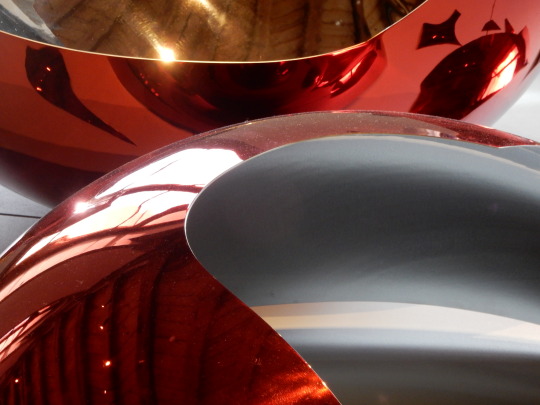


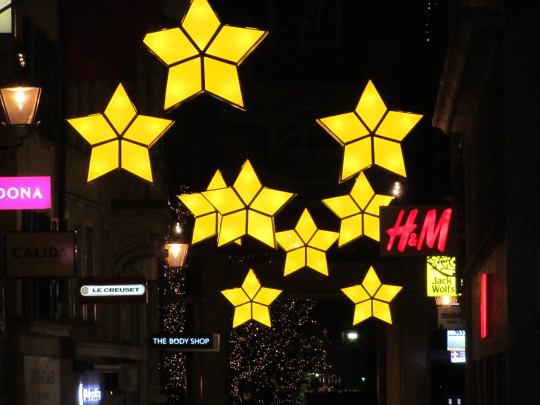


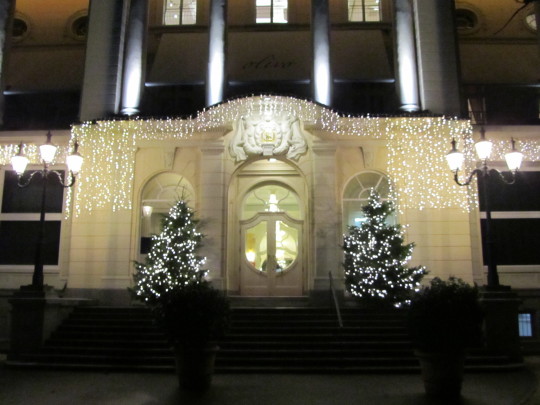


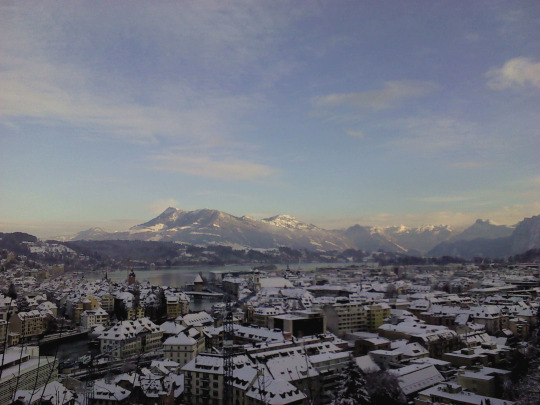
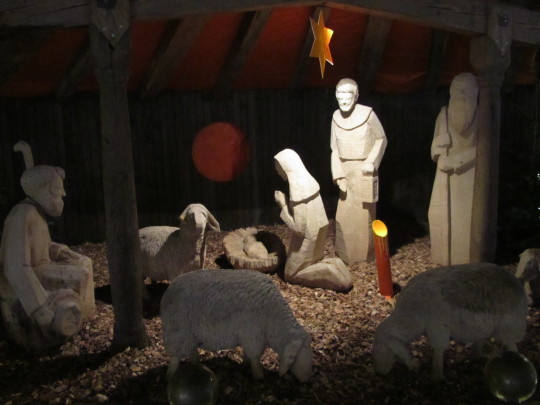


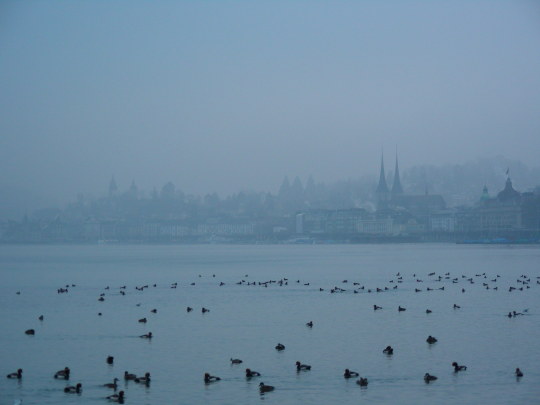
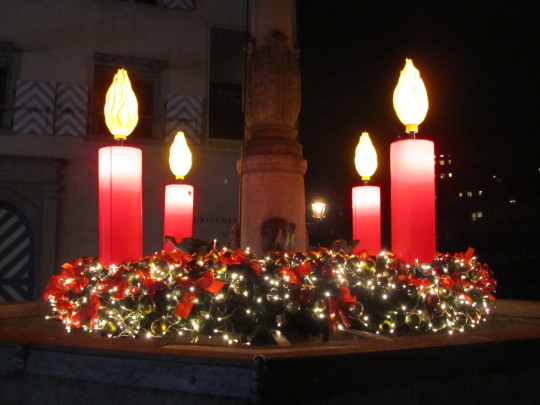
Boxing Day
The best way to celebrate the day is to take part in festivities in a country where Boxing Day is a bank holiday or public holiday. Watch some soccer, rugby, or cricket games, or go on a traditional fox hunt. If you can’t be in a country where these events are taking place, you could still get together with family and friends and eat leftovers from Christmas, or make some foods traditionally eaten on Boxing Day. You could also go shopping, as this is another important part of the day in many countries.
Boxing Day takes place the day after Christmas and is primarily observed in the United Kingdom, where it started, as well as in countries that were once part of the British crown. There are a few possible theories as to how it got started, but its exact origin is unclear.
One theory says it was inspired by Christmas boxes. In seventeenth-century Great Britain, boxes holding a present or gratuity were given to tradesman and workers in service industries for their previous year’s work. This went back to an even earlier tradition where servants would wait on and serve their rich masters on Christmas Day and would visit and celebrate with their own families on the day after Christmas. Their rich masters would sometimes give them a box with leftover food, a bonus, or another type of gift.
The day may have also stemmed from alms boxes that were put in Anglican churches on Christmas Day or during Advent and opened on the day after Christmas. These boxes collected money for the poor. Similarly, boxes were put outside of churches to collect money on Saint Stephen’s Day, which is held the day after Christmas. The events in the song “Good King Wenceslas” take place on Saint Stephen’s Day. The song recounts a story of King Wenceslas, a Bohemian king of the tenth century, bringing food and wine to a poor man. There is one other possible source for the beginning of the day. Ships once set sail containing a box of money for good luck. If the trip was a success, the box would be given to a priest, and he would open it on Christmas and give its contents to the poor.
Boxing Day has been a bank holiday in England, Wales, North Ireland, and Canada since 1871. It is celebrated in Australia, New Zealand, Trinidad and Tobago, and Nigeria. It is celebrated in Hong Kong, where the United Kingdom held sovereignty until 1997. In Ireland and in parts of Spain, it is known as Saint Stephen’s Day. It is celebrated as Second Christmas Day in some European countries, such as Poland, Hungary, Germany, Switzerland and the Netherlands; it is celebrated as such in Scandinavia as well. Boxing Day is generally not celebrated in the United States.
In some countries where it is celebrated as a bank holiday or public holiday, it is observed a day or two after December 26. If December 26 takes place on a Saturday, it may be observed the following Monday. If December 26 is on a Sunday, it may be observed on the following Tuesday. This is not always the case, however, as it is often observed on a Sunday if it falls on a Sunday.
Boxing Day is a day of the gathering of family and friends. Leftovers from Christmas are commonly eaten. Popular foods include baked ham, mince pies, Christmas cakes, and other desserts. In many countries of celebration, it is a shopping day similar to Black Friday. Sales take place and many retailers run them the whole week. Although, in some places, such as in parts of Canada, stores aren’t allowed to be open, in order to give families time to be together instead.
Sports are an important part of Boxing Day. In the United Kingdom, the top football (soccer) leagues of England, Scotland, and Northern Ireland play games. Lower leagues play games as well, and rugby leagues also hold matches. In various countries, events of other sports, such as cricket, horse racing, yacht racing, hockey, and boxing are often held to celebrate the day. Fun runs and swims in the cold English Channel take place. Fox hunting meets have been held for hundreds of years. A law passed in 2004, which went into effect the following year, banned the use of dogs to attack animals during hunts. But hunters have still used their dogs to chase artificial scents on the day, and have still gone on hunts where dogs are used to flush out foxes, but not to attack them.
Boxing Day, also known as Saint Stephen’s Day and Second Christmas Day, is being observed today! It has always been observed annually on December 26th.
Source
#Stephanstag#not for a long time#travel#Atlanta#Christmas in July#hotel lobby#Boxing Day#26 December#Georgia#Schweiz#Switzerland#Luzern#Lucerne#Lake Lucerne#Rigi#snow#River Reuss#old town#Christmas lights#night shot#landmark#tourist attraction#Saint Stephen’s Day#Second Christmas Day#holiday#BoxingDay#SaintStephensDay#Melchsee Frutt#Vierwaldstättersee#Obwalden
4 notes
·
View notes
Text
I literally live in Canada and use iplayer almost everyday. Just use a VPN and lie when the website asks if you have a license.
If you’re in the UK remember to cancel your TV license and never buy a new one. If an inspector comes around to frighten you into buying a new one don’t answer any of their questions. Ask “Who are you? Can I see your ID?” then say “No thanks” and shut the door. They are completely powerless, they can do nothing unless you hand any information over by talking to them. It is a silly system and run by a disgusting company that works through intimidation and preys on those who they perceive as weak.
#tv licence#bbc#you don’t need one if you watch catch up services (excepting iplayer) and streaming#uk#United Kingdom#northern ireland#wales#scotland#i mean it made sense years ago but today tv licenses are a rip off#any decent show the bbc puts out is availiae on other platforms#i often see leftists over here defending it but tv license goons literally go after women elderly people and poor working class people#they revoked the free license for over 75s and in general are just a really scummy organisation#we already pay taxes#i wouldn’t mind paying for it if the people demanding you pay it weren’t so despicable and if I actually used live tv#but even if you say you only use Netflix Prime Disney+ or whatever they can still prosecute you if you so much as have a tv in your house#if you’re worried and a student remember your parents counts when you’re in halls provided you’re not connected to the mains for some reason#pssst if you’re really worried but love BBC stuff download a vpn shhhhhh#a tv licence is 153 big chocolate bars y#or 5355 dipdabs
18 notes
·
View notes
Text
I don’t really know how to communicate how scary everything is in the UK right now. Just… that we are running on 12 years of austerity politicise, the knowledge that we don’t have a free, independent press, that given our broken FPTP system and the way constituency boundaries have been redrawn, we’ve probably *had* our last free and fair - and that it’s only going to get worse - that our NHS is on its knees, and that in 2019 a leader running on a truly progressive platform garnered mass support and a vast number of votes, but *lost* seats, and the way that this absolutely *terrified* our commentariat, so that he was persistently smeared in our allegedly unbiased and independent press until public opinion turned against him, and that meanwhile just under 50% of the population are convinced that what we actually need is something more adjacent to fascism.
The fact that during the pandemic, the government has lied, broken the law, laughed at the mass death, handed public money to their mates, sold off public assets and handed the money to their mates and that all of this is just the continuing trend of this 12 year government of liars and frauds. Some of these mates, incidentally, have alarmingly close ties with organisations like Kiwi Farms who have *absolutely* been interfering in our elections and national discourse generally.
Meanwhile, we’re having a cost-of-living crisis, wages are stagnated, and people are having to decide between feeding their families and paying their rent and heating their homes. People are literally dying of hunger after being penalised by our broken welfare system in ways that are declared unlawful which I’m sure was a *great* comfort to their grieving families. Meanwhile, we are deporting and imprisoning people fleeing international violence, and homophobic hate crimes are skyrocketing, and racial violence is only increasing. Meanwhile protest has been more or less criminalised and we are entering the early stages of ethnic cleansing against our traveller population. Meanwhile a tiny, but *very* well funded and connected little cabal of bigots have decided that trans people are to blame of all of this.
Meanwhile, let’s drape everything in the fucking flag and spend a couple of billion on the fucking jubilee. Never mind that around half the population don’t want ANY of this, but that we’re stuck here, our votes meaningless, our healthcare precarious, the very basics of our lives becoming unaffordable… All our industrial safety, food safety, environmental safety legislation is looking to be stripped - and has already taken a battering. Our unions have been rendered nearly powerless. We are looking at throwing away the Good Friday Agreement. Politicians have been touting the idea of forcing the unemployed, elderly and disabled to work in the fields. We’ve lost any real social safety net this country ever had. There is spreading popular support (presumably among the aforementioned pro-fascism contingent) for bringing back the death penalty.
And before anyone goes “lol, Britain” on this post, believe me, the people who are going to die from this will not be the white, cis, het conservatives you’re thinking of. It will be people of colour, immigrants, our Jewish and Romany communities, it will be poor people, disabled people, queer people. It will be our passionate, left wing organisers, and our political dissidents. It will be Scotland and Wales and Northern Ireland, and the former ‘red wall’ of the North who suffer. Even in England… if you can get it round your heads that there are good people in the Deep South of America, who are disenfranchised and afraid - then can you please understand there are good people here, too? People who are scared and don’t have the resources available to them to leave, whose votes will never count for anything because of our broken electoral system. People who should not have to leave their families and homes because of this.
Anyway, I’m fucking terrified. I don’t know that we can turn this around. I just pray every single day that I’m wrong and try to help build resilient communities of care where I can.
9 notes
·
View notes
Note
The football kick thing made me laugh, then I wondered how on edge col would be if linden was really invested in the World Cup or something (I’m American idk anything abt soccer), like would he be the type to get invested in watching the games and stuff and cheer for his teams and boo the other teams, or is he too much of a hermit?
you can get invested in any sport if you watch a match long enough!! on his own he's too much of a hermit to care (and it's just not his thing anyway) BUT his brother Vik would come swaggering over to Linden's door with some beers and tell him to stick it on
whether it was England/Scotland/Wales/Northern Ireland/basically any country in a vague proximity they'd support them, cause it's fun. India has never been good enough to qualify😭😂 so they can't cheer for them lol
and in about.... 30 minutes, Linden would reluctantly find that it is quite exciting when their team scores. and in 20 MORE minutes he'd be rising out of his chair the closer they get to the goal. and soon he and Vik would be shouting COME ON and GET IT IN THERE!!!! like a pair of true footy fans. man this makes me miss watching football😩
but yes poor Col would either be in his room shaking as his Master and Master's brother shout and scream and get worked up downstairs, or he'd be watching from the floor and flinching every time one of them makes a loud noise. poor babby. and he would be worried that if they don't win they'll need a slave to take their aggression out on
34 notes
·
View notes
Note
rest of the british isles drinking headcanons? dunno if you've already done this
Sorry this took so long for me to actually post, my ability to write headcanons left the station for a hot sec but anyways. I feel like they’d all chose a pub over a club anyway, with maybe the Ireland’s maybe being the exception.
Hws Drinking Headcanons:
Hws England’s: here
Hws Scotland: Alistair is the most frequent drinker in the British Isles. Most nights, he’ll have pint or two and talk with the other regulars at, what is definitely, a old man pub. Even when he opts to stays at home he’ll usually pour himself a scotch to drink. Alistair’s reason for drinking is probably a mix of habit and that he just likes it. But, unless he’s drinking with another nation, he’s very rarely drunk. He usually only drinks enough to be slightly buzzed. (When he is drunk though-he’s an extroverted drunk. He’s usually pretty standoffish with anyone that he doesn’t know but as soon as he’s drunk he’ll have full on conversations with strangers. He’ll go to the bathroom and not return for an hour cause he stopped to chat with people kinda vibe.)
Hws Ireland: Whenever they drink, their aim is usually just to have a good time. So they tend to only drink when with other nations, which is still pretty frequently. Beer is their drink of choice, it’s usually Guinness, but it’s always Irish and good luck to any poor soul who tries to argue that another country makes better beer. Wagers should be expected on a night out with them. They’re the first one to suggest putting a bet on pub games or on who’ll win the sports game they’re watching. (I’m sure you can imagine how competitive UK countries gets.) And some bad decisions are guaranteed when they’re drinking with Alistair or Arthur (“I bet you can’t-“just you fcking watch me”) They’ll either end a night out having earned some money or a new memory of Arthur embarrassing himself, so win-win. (They’re a pretty laidback drunk I think, they’re just vibing. Probably the friend leaves without telling anyone and decides that the hour long walk is better than getting a taxi. I also imagine they tell good stories when their drunk.)
Hws Northern Ireland: How physically old is he?? I can never decided but I’ll say he’s at least 18 for now. Regardless though, the other countries in the British Isles will still tease him. He’s doesn’t let any of the British isles order his drinks for him because without fail Ireland or Scotland will always order him a half pint and then make a joke about him being a kid… Anyway, he’s drinking to have fun. He’s the one whose trying to get everyone as drunk as possibly and starting the chants to get his friends to chug their drink. And he’s notoriously good at bouncing coins into people’s drinks so they have to finish their drink. Plus he’s probably the person convincing everyone to play a drinking game. If he’s having a pint he’ll also chose an Irish beer but probably favours a spirit and a mixer. In hindsight I realise that he’s essentially a mix of Ireland’s ‘here for a good time’ and England’s ‘here to get plastered’ attitudes. (He’s probably a pretty high energy when he’s drunk. Probably cracks a lot of childish jokes and laughs too much at things that weren’t that funny.)
Hws Wales: Dylan probably drinks the least often out of the UK countries? He’ll have a few pints when he’s watching a rugby game or something but he doesn’t frequently go to the pub or drink at all. That being said though, somehow he can still drink the most alcohol in one sitting out of the British Isles. Does he have a high tolerance or is he just act the same drunk as he does sober? Who knows, but it annoys Arthur and Alistair to no end. He doesn’t drink a lot of spirits though, he prefers beer or cider. (I kind of feel like he just acts the same as if he was sober when he’s drunk. Like he’ll give a proper goodbye to everyone at the end of the night but still wake up the next morning in a field somewhere and just never mention it.)
#hetalia#hws scotland#hws ireland#hws northern ireland#hws wales#hws uk bros#I’m gonna charge that tagggg#hws United Kingdom#better???#hetalia headcanons#I kinda wanna do one of these for the tom*to gang ngl#apparently wales had the highest percentage of beings drinkers in the uk in 2016 🤔#a percent above Scotland#I kinda feel like Ireland’s would maybe fit north more??? mannn idk I don’t have too much of a vibe for them#asks#alistair kirkland#dylan kirkland#my headcanons
34 notes
·
View notes
Text
“...Medieval western Europe had two basic patterns of settlement — the hamlet and the village. In general the hamlet was found in the least productive regions such as Scotland, Wales, Ireland, Brittany, and the mountainous districts of France. While it is possible that the hamlet was essentially a Celtic institution, it seems just as likely that it was simply the natural form of settlement in the barren lands into which the Celts had been driven by their Germanic foes. The rest of western Europe was a land of villages. There would be a cluster of houses, or rather huts, each with a small fenced garden and perhaps a fruit tree, a church, and usually a manor house or castle. Around the village lay its arable land and meadow — beyond lay the pasture, waste, and woodland. The men who lived in these villages and hamlets used three fundamentally different ways of cultivating their arable land. The crudest of these is commonly called the infield and outfield system. Although it was not completely confined to the regions of hamlets, it was most common there.
Under this system the farmer had a small garden or infield near his house that he kept in continuous cultivation by using the manure from his animals. Then he would go out and plow a piece of land some distance away, grow crops on it until it lost its fertility, and then abandon it and plow another piece. This method of exploitation was suited to a region with a large amount of available land, none of which was very fertile. Another system was to divide the arable land of a village into rectangular plots assigned to the various houses. This was the standard practice in southern France and in Italy. But over the major portion of western Europe the dominant method of cultivation was what we call the two- or three-field system. The arable land of the village was divided into two or three large fields. When there were two fields, one was cultivated and one allowed to lie fallow each year. When there were three fields, two were cultivated and one lay fallow. It seems likely that originally all villages used the two-field system and that the third field was adopted as an improvement in the more fertile regions.
These large fields were divided into long, narrow strips and each house in the village had an equal number of strips in each field. The region of the two- and three-field systems comprised the richest and most populous part of western Europe, extending from the border of Wales through England, northern France, and the major part of Germany. The agricultural methods of the eleventh century were not very efficient. As the plows were heavy and clumsy and the harness poorly designed, from four to eight oxen were required for a plow team. Moreover, the slowness of the oxen made the area that a team could care for rather small. The sole crop in the arable fields was grain. It was sown broadcast to the delight of the birds. The seed was simply a part of the previous year's crop. The land as a rule received no fertilizer beyond the manure deposited by the cattle that grazed upon it while it lay fallow. Hence the production per acre, per bushel of seed, and per man was extremely low.
This meant that if the people of the village were to have enough to eat, all land that could be plowed had to be utilized. As good meadow should be as fertile as arable land, there was nearly always an acute shortage of meadow and therefore of hay. Most villages could only hope to gather enough hay to keep their plow teams and a few breeding cattle alive through the winter. The pasture land was usually poor and often simply waste. In summer the cattle found a meager living in the pastures and in the fall most of them were slaughtered. In some regions such as England and parts of Germany the grain grown on the arable supplied both food and drink. It is estimated that in England about half the grain was used for bread and the other half for ale. The wine-growing districts were more fortunate, as land too steep to plow would grow vines. From the gardens behind their houses the villagers obtained a few common vegetables. The cattle were valued for their hides, milk, and meat.
The milk was made into cheese. Every village had a few sheep to supply wool for clothing and chickens for meat and eggs. But the chief source of meat was the pig. Pigs could find their own food in the woods in both summer and winter. In Domesday Book the size of a village's woodland is commonly measured by the number of pigs it could feed. Each house or tenement in the village had its strips in the fields and a share of the meadow. The other resources of the village territory were used in common. The villager pastured his cattle in the common pasture and waste, fed his pigs and gathered his firewood in the common woodlands, and fished in the village stream. All the agricultural activities of the village were conducted by the community as a whole. The villagers decided when to plow, when to plant, and when to harvest, and all worked together. Certain men were assigned special tasks such as herding. The villager lived in a rude hut with a thatched roof. A hole in the roof let out some part of the smoke from the fire.
His clothes were crudely fashioned from the hides of his cattle and the wool from his sheep. He was never far removed from the threat of starvation. In general, throughout the village region thirty acres of arable land seems to have been considered a normal tenement and experts have calculated that this would support a family in ordinary years. But many tenements were smaller than thirty acres and there were bound to be bad years. And the high cost of transportation by ox-cart over bad roads meant that even a local crop failure would result in a famine. For the mass of the population of western Europe the village was the political, economic, social, and religious unit. The villager found his amusement in the village fetes. The village priest performed the sacraments and gave his flock what little knowledge they had of the world of ideas. As he was likely to be barely literate, this knowledge was bound to be slight.
The villagers were both devout and superstitious. The countryside abounded in miracle-working springs and trees and its people venerated a multitude of local saints never officially recognized by the church. The legal status of the villagers and the proportion of their produce that they could keep for their own use differed sharply from region to region and even from village to village. By the end of the third quarter of the eleventh century the seignorial system was firmly established in England, France, and western Germany. In these broad regions almost every man who worked the land owed some form of rent or service to a lord. In Saxony and parts of eastern Germany the villagers still depended directly on the king, but the seignorial system was spreading rapidly, aided by the political anarchy of the last quarter of the century. But even where the seignorial system reigned there were striking differences in conditions.
In southern England, most of France, and Alsace and Lorraine, the vast majority of the villagers were unfree, bound to the soil and with no property rights against their lords. In eastern and northeastern England, the ancient Danelaw and East Anglia, a fair proportion, probably over half, of the villagers were freemen who paid rents and certain carefully defined services to their lords. Some parts of France such as the region about Bordeaux contained many freemen. In eastern Germany the free villagers were gradually being reduced to serfdom but the process was by no means complete. The seignorial system was a set of institutions through which the feudal class, soldiers and prelates, drew their support from those who tilled the land. In most of the vast region occupied by villages using the two- and three-field systems it was based on what we call manorial organization.
The lord of the village had his demesne, strips in the fields that his tenants cultivated for him. The villagers plowed the demesne, sowed it, harvested the crops, and stored them in the lord's barns. The demesne might occupy as much as a third of the arable land, but was usually rather less. Then the villagers paid the lord a percentage of the crops grown on their own strips. The lord considered that he owned the common resources of the village and charged his tenants for their use. Thus the villager paid a rent in pigs for feeding his swine in the woodlands and in cheese for having his cattle in the common pasture. When the villager fished, the lord got a share of the catch. In short, the tenants owed a rent in kind for the use of every resource of the village. In addition, they worked for the lord at cultivating his demesne, harvesting his hay, or any other task he might set.
Sometimes these labor services occupied as much as three days a week. The lord and his household obtained their food from the rents and the produce of the demesne. The lord's clothes were made from the wool of his sheep spun and woven by the village women under his wife's direction. His dwelling was built by his tenants' labor services. The rents and services mentioned in the last paragraph were due to the lord as the owner of the land. In addition, the lord usually had extensive and profitable rights that were essentially political. As the feudal system developed, the functions and powers of government had been parceled out among the members of the feudal hierarchy. Although in strict theory they exercised these rights as representatives of the king, the fact that the powers were hereditary made "them regard them as their own property”. The extent of these seignorial powers differed according to the custom of the land and the status of the lord.
In England the king kept a firm grip on the higher criminal jurisdiction and the lords of villages could have little more than what we would call police-court justice. In Normandy the duke was equally jealous of his rights. But in most of France and western Germany a man of importance in the feudal hierarchy would have complete jurisdiction over the people of his villages. A lesser lord would have more limited rights. These rights of jurisdiction were important to a lord from several points of view. For one thing they contributed to his prestige — lords with powers of life and death considered their gallows one of their prized possessions. Then they gave a firm control over tenants and complete freedom to discipline them at will. Finally they were extremely profitable. When a man was hanged, the lord could seize all his possessions, and the penalty for many offenses was a fine.
The possession of seignorial authority gave a lord many opportunities for profit. He could hold a market in his village and collect a toll or sales tax on all goods sold. He could establish fees for crossing a bridge or sailing down a stream. He could also establish monopolies. Thus many a lord compelled his tenants to have their grain ground at his mill and to bake their bread in his ovens, paying generous fees in grain and flour. He forbade his tenants to keep doves while his waxed fat on their crops. The unfree villager was almost completely subject to his lord, especially when the latter had rights of jurisdiction. In theory criminal justice was a function of the state and the unfree as well as the free were subject to it. In England this theory was a reality. Except in minor offenses the lord had no criminal jurisdiction over his unfree tenants and if he committed a crime against one, he could be haled into a royal court.
But in France and western Germany the governmental powers were so distributed that if the lord of a village could not hang his serfs, the lord next above him could, and would be delighted to do so at his request. Nowhere did unfree tenants have any civil rights against their lord. He could demand any rents and services he desired and take any of their property that struck his fancy. The arbitrary authority of the lord was, however, restrained by several circumstances. The men of the Middle Ages were basically conservative — their tendency was to do what their ancestors had done and distrust innovations. Hence a lord hesitated to increase the customary dues of his villagers. Then it was obviously to his interest to keep his labor supply alive and this in itself limited the rents and services he could demand. Finally the church insisted that serfs had souls and urged the lords to treat them as fellow Christians. Rather grudgingly the lords admitted that serfs could marry, but they insisted on calling their families stquelae or broods.
Throughout history progress in agricultural methods has been slow and gradual. As our information concerning the eleventh century is extremely scanty, it is almost impossible to say to what extent and in what ways agricultural techniques were improved. There is some evidence that villages were changing from the twoto the three-field system and thus increasing their utilization of their arable land. It seems likely that improvement in the design of plows and the harnessing of oxen was allowing a reduction in the size of the plow teams and by this means lessening the demands on the meadows. Perhaps the chief problem connected with eleventh-century agriculture is the extent to which the available arable land was increased by reclamation. We have clear evidence that in the early twelfth century there was extensive clearing of wood and brush land and that some inroads were made on the edges of the great forests.
There was also some draining of marshes, especially when it could be done by a system of dikes. In the twelfth and early thirteenth centuries colonists from all over Europe settled the lands to the east of the Elbe in Germany. There is evidence that this great reclamation movement started early in the eleventh century, at least to the extent of returning to cultivation the lands that had been deserted during the Viking invasions, but it is impossible to estimate how much was accomplished. It seems clear that the initiative in this movement was taken by lords who wanted to utilize as much of their lands as possible. They made attractive offers to peasants who would reclaim land and settle it — greater personal freedom and lower rents and services. The result was an increase in the lord's resources both material and human. His total rents were larger and more people lived on his lands.”
- Marshall W. Baldwin, “Western Europe on the Eve of the Crusades.” in A History of the Crusades, Volume 1: The First Hundred Years
10 notes
·
View notes
Text
3rd May 1128: Kelso Abbey Consecrated
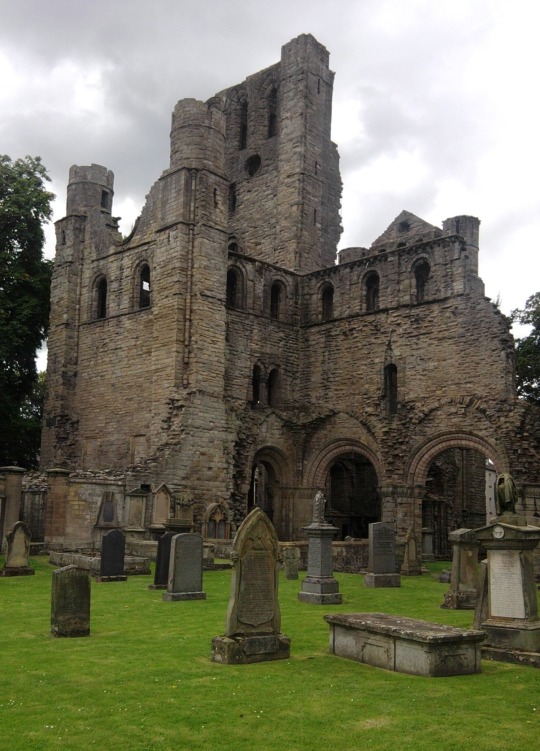
Although King David I was perhaps not as saintly as contemporary chroniclers would have us believe, he certainly founded a lot of monasteries. Setting aside his rather subjective view of what constituted barbarity, John of Hexham’s description of the king’s outward piety is quite revealing:
“There has been none like unto that prince in our days: devoted to divine services, failing not to attend each day at the canonical hours, and also at the vigils of the dead. And in this he was to be praised that in a spirit of foresight and courage he wisely tempered the fierceness of his barbarous nation; that he was frequent in washing the feet of the poor, and compassionate in feeding and clothing them; that he built and supplied sufficiently with lands and revenues the monasteries of Kelso, Melrose, Newbattle, Holmcultram*, Jedburgh, Holyrood- these being situated to this side of the sea of Scotland**, besides those which he benefited in Scotland***, and in other places.”
This list of abbeys patronised by David in Lothian and Cumbria alone reflects the king’s particular spiritual interests. Three of these abbeys (Melrose, Newbattle, and Holmcultram) were staffed by Cistercian monks, and two (Jedburgh and Holyrood) by Augustinian canons regular. These orders were especially favoured by David, and multiple Cistercian and Augustinian houses sprang up north of the Forth as well after he succeeded to the Scottish throne in 1124. But the king also patronised a range of other religious organisations, and his royal descendants and the Scottish nobility soon followed his lead. By the end of the thirteenth century, Scotland was home to an eclectic mix of Cluniac, Tironensian, Culdee, and Valliscaulian monasteries, as well as houses belonging to Premonstratensian canons, and the Knights Templar and Hospitaller, and various Dominican, Franciscan, Carmelite, and Trinitarian friaries. David’s first known foundation reflected this wide-ranging religious interest. In 1113, he settled Tironensian monks on his lands at Selkirk, now the site of a well-known Borders town. This small beginning would have important consequences for the spread of reformed monasticism in Scotland and the overall shape of the mediaeval Scottish Church...
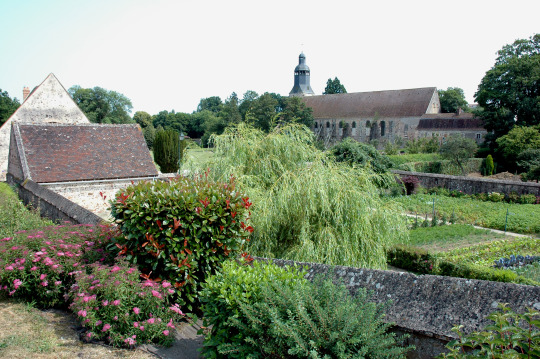
(The abbey of Tiron, the French motherhouse of the Tironensian order. David I visited the abbey himself and the first monks at Selkirk came from there. Source - wikimedia commons where the user Calips has kindly made this image available for reuse under a creative commons license)
David’s project at Selkirk reflected the spiritual trends of the age. The early twelfth century witnessed the blossoming of another Benedictine reform movement, with various new monastic orders popping up all over western Europe (but especially in France). These attracted many people who sought to return to a purer and stricter form of conventual life and who felt that observance of the monastic “rule” of St Benedict had grown too lax, especially in the great abbeys of the day. Citeaux, the motherhouse of the influential Cistercian order which was founded in a marshy wood by Robert of Molesme in 1098, was only the most famously successful example. Another slightly less popular but nonetheless influential foundation was the abbey of Tiron, which is supposed to have been founded by the hermit Bernard of Abbeville in a “wooded place” near Chartres around the year 1109. Tiron was granted its official foundation charter in 1114, and by the 1120s the new order had over a hundred daughter houses, especially in France, Britain, and Ireland.
One of the earliest examples in Britain was the priory of St Dogmaels in Pembrokeshire, which was founded around 1113 and became an abbey a few years later. However apart from that house’s own two daughter houses (Pill Priory and Calder Priory) the Tironensians did not spread much further in Wales, at least not in comparison with the number of traditional Benedictine and Cistercian houses. In England the Tironensian order was represented by only a handful of priories, founded mostly in the first half of the twelfth century, and one abbey at Humberston in Lincolnshire, founded in 1160. Meanwhile Ireland’s sole Tironensian house- Glascarrig Priory in County Wexford – was again a daughter house of St Dogmaels. In Scotland, by contrast, the congregation of Tiron would become extremely influential, both within and outwith the cloister. The “grey monks”, as they came to be known, had arrived by at least 1113, which is when the Chronicle of Melrose claims that David founded a community at Selkirk. The abbey which these monks established, dedicated to St Mary and St John the Evangelist, received its formal foundation charter from David c.1119-20. This also came with a substantial endowment in lands and possessions and the charter was witnessed by many important members of the prince’s inner circle, including his wife Maud, their young son Henry, and David’s former chaplain John, now bishop of Glasgow.
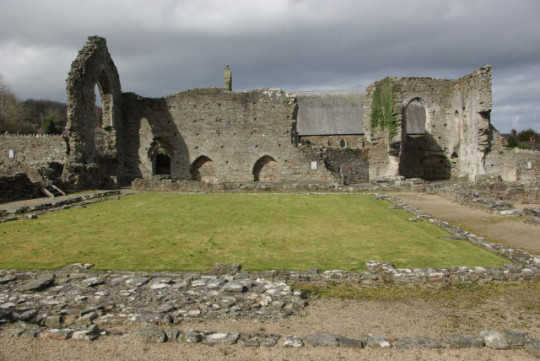
(St Dogmael’s Abbey in Wales, another early Tironensian foundation in Britain. Source: Wikimedia Commons, where user Stephen McKay has kindly made this available for reuse under a creative commons license)
From the beginning, the monks of Selkirk were evidently at the centre of David’s spiritual and political plans. However it is less clear why he singled out the Tironensian order as the beneficiary of his patronage. His choice might have been influenced by his chaplain John, who remained close to David even after his elevation to the see of Glasgow, and who was himself a monk of Tiron (he later attempted to retire to the French motherhouse of the order during the 1130s). Like much of his career, David’s decision to found a Tironensian house may also have been influenced by his relationship with his sister Matilda and her husband Henry I of England. Although neither had a particular interest in the Tironensians, David’s political association with Henry in the years before he ascended the Scottish throne provided him with some of the tools to indulge his own interest in the order. It was with the English king’s support that David secured possession of substantial lands in the south of the kingdom of Scotland, despite his older brother Alexander I’s opposition. His relationship with Henry I also created ties between the future king of Scots and northern France. David not only held lands from the English king around Cherbourg in Normandy, but he was also in touch with affairs in other parts of France, and he is known to have visited the abbey of Tiron in person on at least one occasion before 1114. Although the source of his particular interest in the Tironensians must remain unclear, David plainly found the spiritual ideals and organisation of the fledgling order impressive enough that his earliest recorded action as “Prince of the Cumbrians” was to invite the monks of Tiron to settle on his new lands in southern Scotland.
The new community at Selkirk was apparently quite successful in its early years. Despite the distance between Lothian and the forests of Perche, the monks there retained close links with the motherhouse. The first two abbots of Selkirk succeeded in turn as heads of the order and abbots of Tiron. The monks rose high in the Scottish church too, as the third and fourth abbots of Selkirk succeeded as bishop of Glasgow and bishop of St Andrews respectively. By this time however, it had become clear that the original home of the monks beside the Ettrick water was unsuitable. Within fifteen years of the original foundation, plans were afoot to move the whole community around twenty miles downstream to Kelso, where the River Teviot joins the Tweed.
The new site may have been selected because of its proximity to the royal castle and burgh of Roxburgh, which David had been developing as a political, economic, and administrative centre. After he succeeded his older brother Alexander as King of Scots in 1124, Roxburgh also became one of the most important royal residences in the realm, and it made sense to have the new king’s favoured monastery near at hand. Accordingly, the decision was taken to transfer the abbey to Kelso, although this was to be a gradual process, with the building work and relocation of the monks taking at least two years. Eventually, when the move was largely complete, the abbey church of St Mary and St John the Evangelist was officially consecrated on 3rd May 1128, an event which was probably attended by the king and his leading nobles.
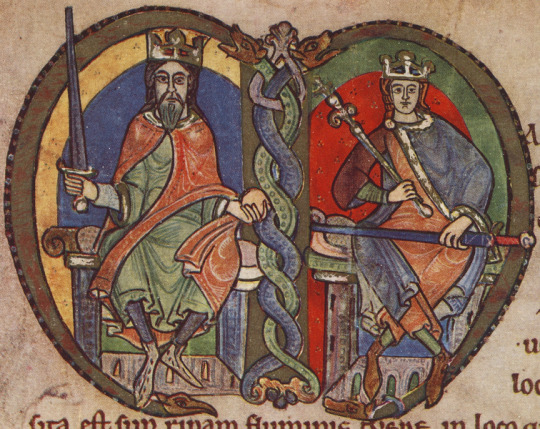
(A twelfth century portrayal of David I and his grandson Malcolm IV in the historiated initial of a charter granted to the abbey of Kelso. Source- wikimedia commons)
Kelso abbey was to become one of the richest abbeys in the kingdom and by the end of the century it had acquired several daughter houses, including the abbeys of Arbroath, Kilwinning, and Lindores. The grey monks could be very influential figures: it has already been noted that Herbert, the abbot who oversaw the move from Selkirk to Kelso was destined to succeed to the see of Glasgow, while his successor Arnold rose to the position of bishop of St Andrews. Another (though much later) influential Tironensian was Bernard, who was first abbot of Kilwinning, then abbot of Arbroath, and then bishop of the Isles and chancellor to King Robert I. And even after David I turned to other reformed orders like the Cistercians to further his spiritual policies, Kelso abbey retained its close links with the royal family. David’s only son and heir, Prince Henry, was buried at the abbey after his untimely death in 1152. One of the abbey’s charters, granted by Henry’s son Malcolm IV a few years later, preserves the only surviving contemporary picture of Malcolm and his grandfather David, who are portrayed in a style reminiscent of the biblical Solomon and David in the historiated capital ‘M’.
Like many other Border abbeys Kelso suffered heavily during the bitter Anglo-Scottish warfare which broke out after 1296. Nonetheless it remained an important and wealthy establishment, the abbacy of which sixteenth century kings and nobles often sought to secure as a commend for their younger or illegitimate kinsmen. In 1460, Kelso even witnessed a coronation when the eight-year-old James III was crowned king of Scots in the presence of his mother and the leading nobles of the realm, following the death of his father during the siege of nearby Roxburgh Castle. The abbey outlasted this castle by at least a century, but not much more. Having already suffered considerably from English attacks during the “Rough Wooing” of the 1540s, Kelso abbey was officially dissolved after the Protestant Reformation in 1560. Much of the abbey was gradually dismantled over the next three centuries. Though the burgh which grew up around the monastery is still thriving today, the building itself is much reduced, with only the central part of the abbey church remaining above ground. The fine Romanesque architecture of these ruins suggests that they formed part of the original church consecrated in 1128. Almost nine hundred years old, the ruined church stands today as a memorial to the former grandeur, wealth, and influence of the Tironensian order in Scotland.
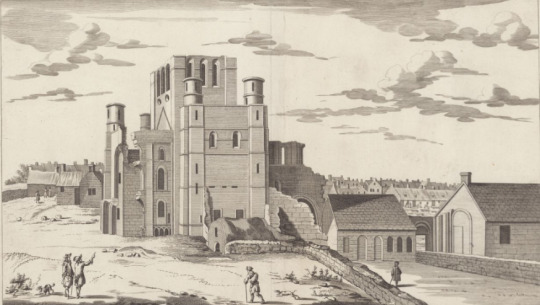
(A seventeenth century depiction of the ruined abbey of Kelso, made by John Slezer. Reproduced under the terms of the Creative Commons Attribution licence, with the permission of the National Libraries of Scotland)
Notes:
* It is actually unclear whether David founded Holmcultram or was simply a patron of the monastery. Of the monasteries on John of Hexham’s list, this is also the only one which does not lie within the borders of 21st century Scotland.
** The “Scottish sea” usually meant the Firth of Forth in the Middle Ages.
*** When John of Hexham says that David also patronised monasteries “in Scotland” he probably means Scotia ‘proper’, i.e. the land north of the Forth, as opposed to Lothian, which is where Kelso, Melrose, Newbattle, Jedburgh, and Holyrood lay in the twelfth century.
Selected Bibliography:
- “Chronicle of Melrose”, as translated in “The Church Historians of England”, vol.4, edited by Joseph Stevenson
- “Early Sources of Scottish History”, edited by A.O. Anderson
- “Scottish Annals from English Chroniclers”, edited by A.O. Anderson
- “Liber S. Marie de Calchou: Registrum Cartarum Abbacie Tironensis de Kelso, 1113-1567″, edited by Cosmo Innes
- “The Charters of King David I”, edited by G.W.S. Barrow
- “The Monks of Tiron”, K. Thompson
- “Kingship and Unity, Scotland 1000-1306″, by G.W.S. Barrow
- “David I”, by Richard Oram
#Scottish history#British history#Scotland#mediaeval#Scottish borders#THE BORDERS#Kelso#Roxburghshire#Kelso Abbey#Selkirk#monastery#abbey#Christianity#Religion#Catholicism#Kirk and people#Tironensian#David I#House of Canmore#monasticism#monasteries#clergy#buildings#places to go#historical events#twelfth century#1120s#1110s#reformed monasticism
21 notes
·
View notes
Text
Happy St George's Day!
· In the midst of a pandemic when schools are all closed, the government votes to not allow free school meals to schoolchildren during school holidays, despite this being the only meal many of them have each day
· Marcus Rashford, a footballer, led the drive to feed the nation’s children, 49% of which live in poverty, and forced the government to provide food for them during the school holidays
· Instead of previous years when vouchers were given to parents that can only be spent on nutritious food, members of government give contracts to friends to provide a week’s work of food costing £5 to schoolchildren for a price of £30. Food is unhealthy and would not last a week
· Parcels also expect parents to cook two tablespoons of rice at a time in the oven and bake their own bread every day, ignoring poverty-stricken families possible lack of access to such equipment
· Wife of conservative MP attacks poor families for eating unhealthy food when healthy food is cheaper, ignoring the fact that not all families have access to equipment needed to store and cook it
· Nigel Farage, head of the Brexit party came out strongly against the government for their stance on starving schoolchildren. Not a good look.
· Another MP came out and said that poor families should not receive government assistance because the money would be going direct to brothels and crackhouses and the parents would spend it on drink and drugs instead of feeding their kids, a dangerous and persistent stereotype of working class people
· For the first time in its history, UNICEF is feeding kids in the UK – the 5th richest country in the world – and the head of the House of Commons accused them of “playing politics” and said they should “be ashamed of themselves”
· J.K. Rowling came out hard as a TERF (Trans Exclusionary Radical Feminist), writing a book about a serial killer that dresses up as a Muslim woman, which isn’t subtle when you look at her history of transphobia and other “-isms”
She also publicly supported an author who wrote a book about the destruction of Europe by waves of Muslim immigration
· Speaking of J.K. Rowling, the government’s response to the Gender Recognition Act.
· It is now impossible for under 16s to receive reversible puberty blockers
· Wait times at NHS Gender Clinics, of which there are only 7 in the country, have doubled, with wait times now up to 60+ months (5+ years)
· Keir Starmer, head of the Labour (left wing) party says he doesn’t want to get involved in trans issues
· With the loss of Labour, no major party supports trans rights
· Self ID is no longer allowed, meaning every step of transition is medicalised and involves the trans person having to prove that they are “trans enough” at every stage to panels of cis people
· Government wants to invalidate non-enrolled deed polls, essentially making available a public list of every trans person in the UK
· Hate crimes have quadrupled
· Anti-trans campaigners are now setting their sights on trans adults’ access to hormones
· A petition was formed to counter this and was reviewed by the government, who determined that nothing was wrong with the GRA except that it might have been a bit lax.
· The Guardian newspaper ran child labour and child starvation supporting stories
· Internal border now along the border of Kent and lorry drivers must produce travel papers (Brexit Passport) to cross it, placing the county of Kent in a state of “no man’s land”
· Government fails to lockdown on time, every time
· Government refuses to ban conversion therapy in the UK
· Scotland adopts Human Rights of Children, which requires the government to better support children and families, especially those who are poor, disabled, minorities or young carers. England does not
· The government declared that sleeping rough is now grounds for deportation
· Schools reopened several times despite being warned not safe to do so
· The government banned NHS workers from speaking out about COVID
· Do Not Resuscitate orders proposed for those in care homes, with learning disabilities and who are autistic
· The government cut pensions as the COVID death toll rose
· The government learnt about new South-East COVID strain in September and didn’t come forwards until December
· New COVID strain targets kids, teens, and young adults, and yet none of those groups are allowed vaccination unless a serious pre-existing condition is had, even if they are key workers
· Downing Street says UK should be model of racial equality because government report says no institutional racism in the UK
· Report also says young people are young and foolish for thinking it exists and that minorities are superstitious and irrational and are sabotaging themselves out of success
· It came out that the government was given the independent report and rewrote it to the version that was released to the public – the version that says racism doesn’t exist in the UK
· The rewritten report also refers to the slave trade as the “Caribbean experience”, like those enslaved were on holiday
· Woman in London abducted, murdered and dismembered by off-duty cop and when socially distanced vigil goes ahead, police wait until dark before trapping women, arresting them, using excessive force on them, and also destroying memorial
· Bill passed in government that allows undercover officers to commit serious crimes such as murder, torture and rape
· Plainclothes police to now patrol nightclubs and bars due to aforementioned murder by police officer
· Bill passed that bans any protest at all, no matter how quiet, unobstructive or small it is, including single-person protests. Bill also includes a 10 year sentence for damaging a statue, which is a longer sentence than for rape
· TV programmes critical of the government have been cancelled
· Universities have been told what to platform and schools have been told what to teach, including banning material speaking about BLM and calling for “overthrow” of capitalism
· Voting has been supressed, mainly those who are working class or POC
· During protests in Bristol, press was assaulted and pepper sprayed by police and two legal observers were arrested
· Being Roma/Traveller and living the traditional Roma/Traveller lifestyle is now illegal under that same bill that bans protests. They also have to register as such and receive a licence or risk losing their vehicles
· Hours before Eid, lockdown across the UK with no warning whatsoever, meaning people woke up the next morning after visiting relatives to find themselves “criminals”. The country was opened up specifically for Christmas though
· Conservative (right wing) party blamed BAME (Black And Minority Ethnic) communities for dying of COVID more than white people
· Landlords have been protected extensively and renters blamed for living in close quarters or having to take public transport to work
· Conservatives have launched investigation into possible corruption in Liverpool Council. Liverpool is a Labour stronghold and if corruption is found then the Conservatives can seize control of the council. No evidence of corruption is present as of yet
· Military threatened to stage a coup if Corbyn (then head of the labour party) became Prime Minister
· Government orders all government buildings in England, Wales and Scotland to fly the Union Flag every day to boost patriotism
· MPs call for the curriculum to require teaching the history of the Union Flag rather than Britain’s many atrocities
· The first fortnight of April saw a mini heatwave with temperatures up to 20°C immediately followed by snow, and this is ignored in favour of debating “vaccine passports” in order to visit the pub
· UK allows for international summer holidays despite being warned it will cause a third wave, such as the situation in Germany
· Government placed asylum seekers arriving in the UK in army barracks where they were to sleep 24 to a room with no open windows or air circulation, and when COVID inevitably ran rampant, the Home Secretary accused the asylum seekers of not following COVID protocol, such as social distancing
· Several accounts of self-harm and suicide attempts were reported from the asylum barracks and were dismissed
· UK to deport unaccompanied minor asylum seekers
· UK refuses entry into the UK for radicalised teen failed by system who joined ISIS. Case is difficult and controversial because teen wishes to return to the UK temporarily to fight for her citizenship after the UK broke international law by stripping it from her, despite her not having dual citizenship. Argument given was that her parents were from Bangladesh and so she could apply for citizenship there. Bangladesh refused. Teen is now stateless and living in a refugee camp after losing several children, unable to fight for her citizenship to be reinstated.
· Rioting in Northern Ireland, which included the first use of water cannons in 6 years, a bus being hijacked and burnt, a press photographer attacked, and people throwing bricks, fireworks and petrol bombs at police, not to mention some of the clashes happening over a peace wall in west Belfast, completely ignored in British media and then later drowned out by non-stop news of Prince Phillip’s death, obscuring any important news from being heard. Riots were over Northern Ireland’s being a part of the UK
· MPs take vote on whether China’s treatment of Uighurs constitutes genocide. They decide it does, but that it isn’t their job to do anything further
· Home Office released their spending for the 2020 fiscal year. It’s a mess, including over £77,000 at an eyebrow salon in March alone, and £6,000+ in Pollyanna Restaurant which doesn't appear to exist.
· When people started questioning the spending, the Home Office sent a tweet fact checking themselves
· Country reopened over the summer for Eat Out To Help Out, a scheme to boost the economy. COVID cases rose sharply and the government then blamed people, but mostly working class people, for not following restrictions such as only leaving the house when absolutely necessary, after telling them it was safe
· Foreign NHS workers denied COVID vaccinations
· GCSEs and A-Levels were cancelled due to COVID-19 and expected exam grades were to be used instead. Private school students received grades much higher than they were expecting, and state school students received grades much lower, some grades falling as far as an A to an E. This was because the government couldn’t imagine state school students being smart enough to receive the high grades they were predicted to get; after much uproar the grades were scrapped, and a new method was introduced
· BBC offered staff grief counselling following Prince Philip’s death, but not after having to report on the ever-rising COVID death toll
· The COVID-19 Infection Survey closed in mourning for Prince Philip, with workers to contact participants to reschedule visits for “as soon as possible” when they return to work
· Census workers told to pack up and go home and were placed on immediate unpaid leave due to the death of Prince Philip, but told they must make up the hours later
· Conservative MPs lobbied for a new royal yacht after voting to keep schoolchildren hungry (see first points)
· The BBC’s complaint page crashed over the amount of complaints they got of their coverage of Prince Philip’s death. It was covered non-stop for over 24 hours and the page came in at over 100,000 complaints before going down
· BBC also fast becoming politically biased despite their requirement to be apolitical, after cutting out the audience laughing at Boris Johnson on Question Time, displaying Corbyn as a communist figure in front of a prominent piece of Russian architecture, and providing a platform for a Conservative MP to tell a stage 4 bowl cancer patient that her life wasn’t valuable on live television
· On the COVID-19 pandemic, the BMJ, (British Medical Journal) said about the government that “science was being suppressed for political and financial gain” by “some of history’s worst autocrats and dictators”
· Not only did Boris Johnson launch Eat Out To Help Out when he was warned it was dangerous, lifted lockdowns too early when he was warned it was too dangerous, reopened schools when he was warned it was too dangerous, but when scientists said the second COVID jab should be delivered within 3 weeks he decided that was too tall an order and it should be within 12 weeks – after a period of radio silence, suddenly the science fit his plan. No scientists came forwards to defend it
· The Home Secretary, Priti Patel, blamed protestors for protests that became violent from police attacking protestors, bullied staff members under her, bought members of staff in her department, said it was “disgraceful” to topple the statue of Edward Colson, a slave trader, in Brighton because it undermined anti-racism protests, held treasonous meetings with Israel with the plan to divert aid money, and threatened to starve Ireland in order to get them to agree to Brexit
· She also wants to set up Australian-style asylum processing centres on British islands, but the islands she wants are in the Atlantic ocean and over 4000 miles away from the UK. This is because she wants to help asylum seekers enter the UK legally, completed ignoring or oblivious to all the reasons that asylum seekers might not be able to do that, and for the fact that to seek asylum you must essentially walk up the border and ask for it
· The bungling of the Track and Trace system – the government spent £10bn on a system to track and trace the spread of COVID-19. All data was stored on an Excel spreadsheet which developed a technical glitch and many results were lost before the system was scrapped
· As Autism Acceptance month began, the BBC ran a story saying the autism causes fascism, and that an autistic person who had chosen to embrace the ideology was incapable of seeing that a neo-Nazi group he joined was morally bad because he was autistic
15 notes
·
View notes
Note
FR33D0M was quietly stalking Britain, looking like he wanted to kill the poor country! FR33D0M just tightly held his flag and was angry :’)
(FR33D0M is back and violent-13 colonies admin)
(Oooo)
“Hey Uncle UK! How’s it going?” Georgia asked while Britain managed to hide his disgust at how much sugar his niece was putting into her sweet tea.
“I’ve been better. I have this odd feeling that someone’s been following me-”
“♪♫ I always feel like, somebody’s watching meeee~! ♫♪” Indiana interrupted, appearing out of nowhere with Tennessee and almost giving his sister a heart attack. Tennessee gave a small wave and continued to play the music.
Arizona sighed, “Not now Indi, I know you get a bit excited because Micheal Jackson is literally the only interesting thing about you-”
“Hey! There’s more to me than Micheal Jackson-”
“-But the adults are talking now.”
“I’m older than yo-”
“Turn off your music and go.”
“I can never have any fun around here.” Indiana grumbled, shooting a glare at Arizona before leaving.
Tennessee stopped the music and sadly moonwalked away.
“But that is odd. Are you sure you aren’t just being paranoid?” Arizona asked, turning his attention back to Britain.
“No, it feels too real to be paranoia.” Britain explained, warily glancing over his shoulder.
“That… doesn’t sound great.” Georgia said, looking worried, “You should be careful. Maybe stick around here for a while? I know you have Scotland, Northern Ireland, Wales, and England at home, but there are more of us here to help in case anything bad happens.”
“Yes… I think I’ll stay for awhile.”
2 notes
·
View notes